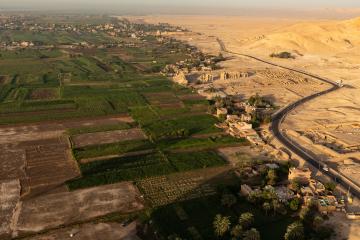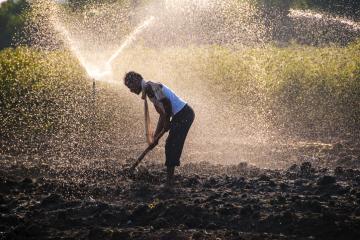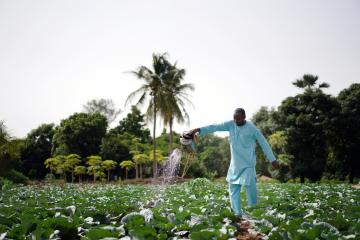
Harnessing evidence and partnerships: Scaling climate resilience at COP29

The impacts of climate change, from devastating floods and prolonged droughts to scorching heat waves and heavy downpours, are expected to intensify over the next thirty years. These impacts will disproportionately affect those experiencing poverty, exacerbate inequalities, trap disadvantaged groups in a cycle of poverty and vulnerability, and threaten to reverse years of progress.
Global events, such as the 29th Conference of Parties (COP29), play a vital role in convening policy experts, decision-makers, and researchers to address urgent global climate challenges. COP29, held in Baku, Azerbaijan, from November 11–22 2024, sought to enhance ambition and drive meaningful action. A central goal was ensuring that all parties reaffirm their climate commitments, with a particular focus on the crucial role of climate finance in meeting these commitments. By generating robust evidence and driving innovation, these funds can be effectively directed toward projects that pave the way for a sustainable future, aligning with countries' Nationally Determined Contributions (NDCs).
In this context, J-PAL Middle East and North Africa (MENA)’s Hub of Advanced Policy Innovation for the Environment (HAPIE), in collaboration with Community Jameel, hosted a roundtable at COP29 under the Marrakech Partnership for Global Climate Action (MPGCA). The session highlighted impact-driven partnerships for food and water resilience, drawing on scalable, evidence-based solutions from the South Asia-based Solutions and Advancements through Research for Water and Air (SARWA) and the UM6P-J-PAL Agricultural Lab for Africa (UJALA). It also brought together diverse stakeholder perspectives, underscoring the power of collaboration and evidence-based policies in addressing climate challenges effectively.
Climate landscape in Africa, MENA, and South Asia
The ND-GAIN Index reveals that sub-Saharan Africa and Southern Asia, the world’s lowest-income regions, are among the most vulnerable to climate change and least prepared to strengthen their resilience.
In sub-Saharan Africa, over 60 percent of the population faces food insecurity. Climate change exacerbates this issue, with extreme weather events projected to reduce staple crop yields by up to 30 percent. Furthermore, low adoption rates of essential agricultural technologies hinder productivity.
Similarly, Egypt, home to a mega-delta, faces rising temperatures and sea levels that threaten agricultural productivity. Key crops like wheat and maize could potentially decrease by up to 30 percent. MENA is warming at twice the global average, further deepening its vulnerabilities.
India shares similar challenges, with its agrarian economy heavily reliant on groundwater—accounting for 87 percent of annual extraction and powering over 94.8 percent of irrigation projects, leading to significant groundwater depletion. Additionally, agriculture consumes 37 percent of India’s electricity, and 22 percent of irrigation is powered by diesel pumps, contributing to the growing climate crisis.
These interconnected climate challenges across regions underscore the urgent need for targeted climate adaptation and resilience-building efforts, particularly given their vulnerability and limited preparedness for climate impacts.
Models of embedded labs: Impact through evidence co-creation

In our session, each lab presented its distinctive model of an embedded lab—whether private-sector or government-led—exemplifying the effectiveness of tailored approaches in bridging research and implementation, tackling critical challenges across diverse contexts. By harnessing strategic partnerships and localized solutions, the labs underscored their pivotal role in advancing scalable, impactful interventions aligned with both regional and global priorities. But how do their models vary?
UJALA is J-PAL's first private-sector-embedded lab, focused on supporting research into scalable agricultural solutions tailored to the unique challenges faced by African smallholder farmers. Its goal is to enhance productivity, profitability, and food security.
A key feature of UJALA’s approach is the multi-stakeholder partnership between J-PAL and OCP Africa, which combines J-PAL’s evidence-based research with OCP Africa's operational infrastructure, market knowledge, and established farmer networks across most African countries. This collaboration enables faster testing and scaling of agricultural solutions, ensuring that interventions are both evidence-backed and practical to implement. The partnership highlights the essential role of both rigorous research and implementation capacity, where each partner’s strengths complement the other’s to optimize impact.
On the other side of the spectrum, the Air and Water Labs (AWL) founded by J-PAL and Community Jameel, represent government-embedded labs in Africa, MENA and South Asia. HAPIE and SARWA, part of the AWL network, work with government agencies to co-generate evidence-based solutions for the most pressing air and water challenges.
HAPIE serves as the fourth thematic area under the Egypt Impact Lab (EIL). Established through a collaboration between J-PAL MENA at the American University in Cairo, the Ministry of Planning, Economic Development, and International Cooperation, and Community Jameel, HAPIE expands EIL’s focus to tackle critical environmental, energy, and climate challenges. This unique public-private partnership aligns evidence-based solutions with Egypt’s strategic priorities and brings a distinct perspective to discussions on climate action.
Similarly, SARWA in South Asia seeks to support federal and state governments in developing evidence-informed solutions to address air and water challenges. The Government of India—with programs such as the National Drinking Water Program (Jal Jeevan Mission) and the National Clean Air Action Plan—has laid out a bold and ambitious vision for protecting the environment. SARWA’s partnership with the Government of Gujarat builds on fifteen years of work in addressing industrial emissions through the use of market-based regulation using emissions trading markets.
Ultimately, both private-sector and government-embedded labs use strategic partnerships and local insights to rigorously evaluate and scale evidence-based solutions, effectively advancing climate action. By adopting similar models, other regions can address climate challenges by leveraging local knowledge and strategic collaborations to develop impactful and lasting solutions.
Leveraging evidence for food and water resilience: Insights from South Asia and MENA
The MPGCA fosters collaboration between non-state actors to accelerate progress on climate adaptation and mitigation. Our COP29 roundtable, Scaling Resilience: Impact-Driven Partnerships for Food & Water through Evidence & Innovation, brought to light actionable, evidence-informed strategies and innovative approaches for aligning with the NDCs. By drawing on lessons from regional and global experiences, practical ways to accelerate effective climate action were explored, particularly in low-income regions where challenges like limited liquidity and credit impede the adoption of climate-resilient technologies.
For instance, in Niger, a randomized evaluation by J-PAL affiliated professors Jenny Aker and Kelsey Jack revealed that training alone significantly increased farmers’ adoption of demi-lunes, a climate-resilient technology, thereby improving land use and agricultural production. However, adding cash transfers—whether conditional or unconditional—provided no additional benefits for adoption. This underscores the critical role of training and knowledge in fostering the uptake of sustainable agricultural practices in resource-limited settings. Similarly, a study in Odisha, India led by Dar et al, provided agro-dealers with information and kits of Swarna-Sub1, a flood-tolerant rice variety, significantly increased its adoption among farmers, particularly those most vulnerable to flooding.
Building on this, extreme weather events like droughts and floods increase farmers' vulnerability, leading to unpredictable crop yields. In India, J-PAL affiliated professors Kyle Emerick, Alain de Janvry, Elisabeth Sadoulet and coauthor David Raitzer, tested a flood-resistant rice variety and found that during floods, these seeds significantly outperformed traditional ones in terms of yield. However, in non-flooded conditions, there was no notable difference in yields between the flood-resistant and traditional varieties. This finding highlights the potential of flood-resistant crops to help farmers mitigate climate-related risks without sacrificing productivity in normal conditions.
In many low- and middle-income regions, smallholder farmers face challenges in adopting productivity-boosting agricultural practices, like fertilizer use, due to barriers such as high costs and limited access to traditional support services. In a study in Western Kenya led by J-PAL affiliated professors Lorenzo Casaburi, Michael Kremer, and Sendhil Mullainathan with Ravindra Ramrattan, a large agribusiness aimed to address this through sending farmers cost-effective, timely reminders about agricultural tasks via SMS messages. The intervention initially resulted in increased yields, higher farmer revenue, and improved company profits. However, a follow-up test one year later showed no lasting impact on yields, highlighting the importance of ongoing support for sustained effectiveness.
Ultimately, by bringing together governments and research institutions, HAPIE, SARWA, and UJALA address barriers such as limited resources and knowledge through the dissemination of evidence, akin to the studies discussed earlier. Their evidence-based strategies provide actionable insights that policymakers and partners can implement, accelerating climate action and fostering inclusive progress toward climate goals.
A collaborative future: Enhancing climate resilience beyond COP29
J-PAL continues to advance climate resilience by leveraging evidence on effective interventions, fostering partnerships, and promoting knowledge exchange. By embedding evidence-based solutions into policy frameworks, J-PAL contributes to global efforts like those discussed at COP29.
A roadmap for integrating these solutions into NDCs emphasizes the importance of adaptive, data-driven policies that are flexible and responsive to emerging climate risks. Moving forward, scaling public-private collaborations and aligning with NDCs will be crucial to accelerating progress toward climate resilience, with evidence-driven approaches and multilateral partnerships key to tackling the climate crisis.
For more information on partnering with J-PAL MENA to generate and use evidence to support climate resilience in MENA, South Asia or Africa, please contact Yomna El-Awamri at [email protected], Sanjana Gorti at [email protected] or Malik Abaddi at [email protected] respectively.
Related Content

Navigating climate justice in MENA: Emerging carbon markets

J-PAL South Asia and Community Jameel reaffirm their commitment to increase clean air and water access with the launch of SARWA



